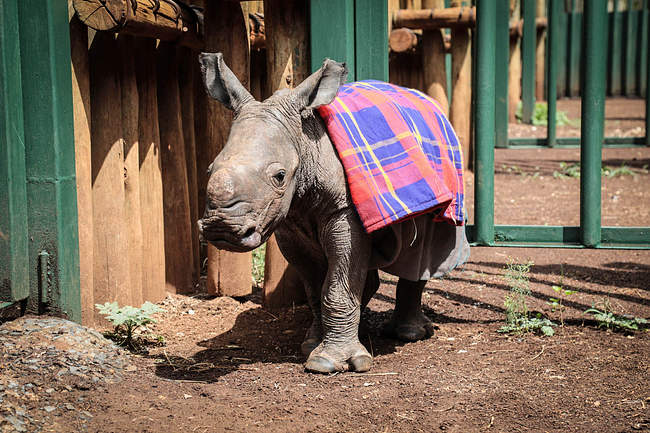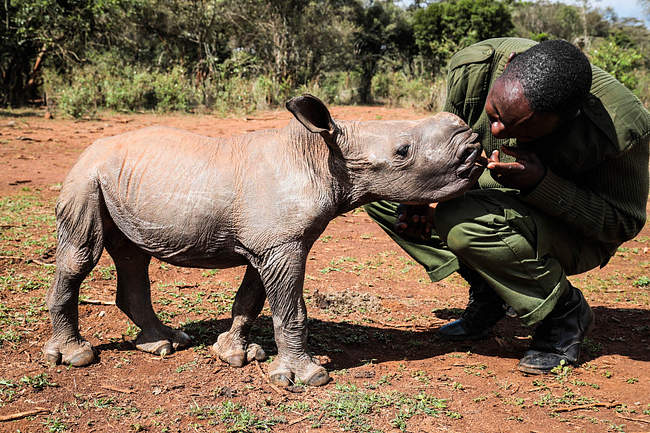This month short rains continued in parts of Northern Kenya so there was still plenty of grass and water for the wildlife. All Veterinary cases reported were promptly attended to.
CASE#1 RESCUE OF A WHITE RHINO CALF
Date: 2 November 2018
Species: White rhino
Sex: Female
Age: Newborn
Location: Meru National Park
On 1st November a new born white rhino calf got stuck in a mud pool in Bwatherongi swamp at the Rhino Sanctuary. When rangers on patrol approached the scene at 07:00hr, its mother ran off leaving the calf.

The rangers retrieved the calf, which was estimated at two days old, from the mud pool and observed from a distance in anticipation of reuniting the calf with her mother. As the mother had not returned by night fall, the calf was housed nearby and oral rehydration using Glucose/Electrolyte solution was administered.
On 2nd December, at first light, a helicopter located the calf’s mother (Makosi 70W68) but repeated attempts to entice the calf and mother to reunite failed. The calf was then air lifted to the David Sheldrick Wildlife Trust (DSWT) orphanage in Nairobi where she will be raised and later reintroduced back to the wild.
CASE#2 RESCUE OF A COMMON ZEBRA FOAL
Date: 26 November 2018
Species: Common Zebra
Sex: Female
Age: Infant
Location: Dol Dol
This zebra was rescued by a livestock herder after it was abandoned by its mother and housed overnight with a herd of goats. The KWS station in Dol Dol requested for a veterinary assessment of this foal.

Mild dehydration and bruises were found in the head and dorsal aspect of the thorax. Oral Glucose and Electrolyte solution was administered to rehydrate the foal. The foal was handed over to an orphanage in Northern Kenya for nurture and later reintroduction into the wild.
Our mobile vet initiative is in the field every day saving wild lives
CASE#3 HORN FRACTURE IN A GIRAFFE
Date: 28 November 2018
Species: Reticulated giraffe
Sex: Male
Age: Adult
Location: Meru National Park
History: This injured giraffe was found by the research monitoring team while on routine patrol in the Meru National Park, near Kubai road. It had a broken left ossicone (horn) and a septic wound on the skull. We immobilized the giraffe to assess the injury.
Immobilization, examination and treatment: A combination of Etorphine Hydrochloride and Azaperone delivered in a single 3cc DanInject dart into the pectoral muscles was effective to restrain the giraffe. Seven minutes later it was roped to lateral recumbence for examination.

We found a broken left ossicone and fracture of the bones of the skull with septic wounds and sinuses. Injuries suspected to have been sustained during a fight. Fracture of the bones of the skull causes severe pain and infection may infiltrate the brain. To alleviate pain and suffering this giraffe was euthanized by injection of 20% Pentobarbital Sodium.
CASE#4 RESPIRATORY INFECTION IN CAPTIVE CROCODILE
Date: 1 December 2018
Species: Nile crocodile
Sex: Male
Age: Adult
Location: Meru National Park
History: A crocodile at the Meru Museums captive facility was reported to have shown respiratory distress and anorexia for the past 4 weeks.
Restraint, examination and treatment: We drained water from the pond where the crocodile was and a capture net was deployed to physically restrain the crocodile. Clinical examination revealed purulent mucous discharge from the nostrils, labored respiration and snoring, all signs of an upper respiratory tract infection. Diagnosis: Common causes of respiratory infection in crocodiles include mycoplasma organisms. The following treatment was given and advised:
Pond hygiene: regular cleaning by scrubbing and disinfection of pond including use of Copper SulfateTylosin Tartate 3000mg was administered intramuscularly, and is to be repeated after 48 hours. Betamox LA Trihydrate 3000mg was administered intramuscularly and to be repeated on the third day.
Acknowledgement
Report by KWS Vet Dr Rono. Mara Mobile Veterinary Unit would like to thank all partners and stakeholders who helped them in the course of their duties during the month. We thank the KWS Management for logistical support and rangers in the field who bring cases of injured animals to our attention.



